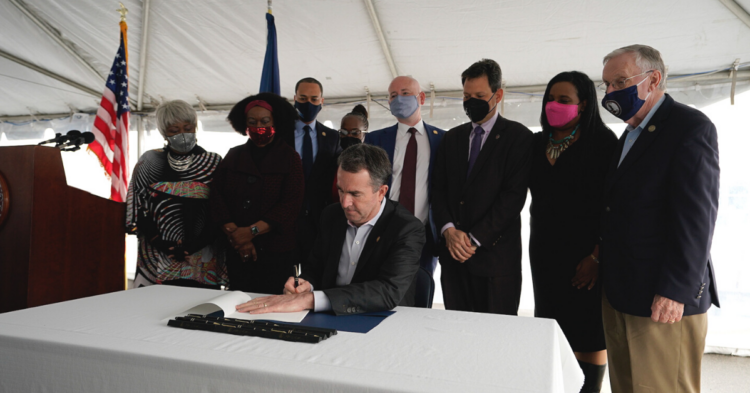While there is certainly a historically passionate debate about the death penalty in the U.S., the nation finds itself on a shrinking list of countries that still carry out executions.
As the BBC reported, as of 2019, only 33 countries had even carried out one execution since 2013, and 142 have now abolished the practice either in law or simply by not doing them anymore, which is up from just 48 in 1991.
Although the U.S. may still carry out executions on a federal level, one less state will now do so, and it’s a historic first for the nation.
In a signing ceremony, Virginia Governor Ralph Northam officially made the commonwealth the first state in the South to abolish the death penalty.
“Justice and punishment are not always the same thing, that is too clearly evident in 400 years of the death penalty in Virginia,” Northam said ahead of the signing, according to NBC News . Per historical records, Virginia carried out its first execution at Jamestown colony in 1608, and no state has executed more people than Virginia.
“When one looks at the history, close to 1,400 individuals have been executed,” Northam said. “The great majority of those individuals were African American. And so that number was disproportionate. The fence, the representation of African Americans has no doubt been disproportionate.”
Usage of capital punishment was already in decline.
Juries in Virginia have not handed down a death sentence since 2011 and no prisoners have been executed in the state since 2017, NBC News reported.
However, regardless of its usage, Northam called ending the death penalty the “moral thing to do,” and said that even in cases of extraordinarily heinous crimes, “two wrongs don’t make a right.”
Northam also campaigned on ending the death penalty in Virginia. With his signing of the bill, the commonwealth became the first former Confederate state and the 23rd overall to abolish the death penalty.
The movement to abolish the death penalty did face some opposition.
Law enforcement in particular argued in favor of keeping the death penalty for cases involving the murder of police officers, NPR reported, and the Republican party in general opposed abolition.
However, proponents of abolition argued that the system is too prone to mistakes to keep the death penalty. “I can say the death penalty is fundamentally flawed,” Northam said, according to NBC News. “We know the system doesn’t always get it right. Make no mistake — if you commit the most serious of crimes, you will be punished.”
Several victims’ families also argued in favor of abolition.
Rachel Sutphin, daughter of murder victim and police officer Eric Sutphin, objected to the execution of her father’s killer, William Morva, who was executed in 2017, NPR reported. Sutphin objected at least in part because Morva had been diagnosed with a serious mental illness.
“There are many of us, and we have continually spoken out. This is not what we want,” Sutphin told NPR. “However, we do want to honor those who disagree with us. We are not speaking against them, but against this issue that we see as wrong in our society.”
Others have cited racial justice issues in banning the death penalty.
The Black Lives Matter protests that erupted in 2020 certainly played a role. Michael Stone, executive director of Virginians for Alternatives to the Death Penalty, told NPR that the governor’s own controversy with blackface in 2019 may have propelled him to take action.
As he said, “I think the governor’s blackface scandal certainly predisposed him to being far more sensitive about racial justice issues.”
And the Virginia Interfaith Center for Public Policy’s LaKeisha Cook told NBC News that abolition of the death penalty provides an opportunity to put a painful history firmly in the past.
In her words, “Now that it is coming to an end, we can start a new chapter that embraces an evidence-based approach to public safety: One that values the dignity of all human beings and is focused on transforming the justice system into one rooted in fairness, accountability, and redemption.”

















































